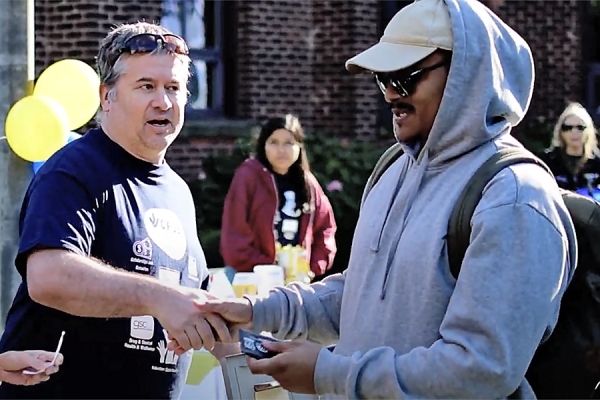 Jillian Holland-Penney, Saher Zaidi, and Jessica Glazewski facilitate Flip the Script workshops in sexual assault resistance.
Jillian Holland-Penney, Saher Zaidi, and Jessica Glazewski facilitate Flip the Script workshops in sexual assault resistance.
The Office of Sexual Violence Prevention, Resistance, and Support is once again offering its sexual assault resistance education program for university-aged women, “Flip the Script with EAAA” for Enhanced Assess, Acknowledge, Act.
The 12-hour workshop is the centrepiece of the “resistance” aspect of the office’s work, says director Dusty Johnstone.
“Prevention is a goal that requires active involvement from the community and social change, which takes time,” she says. “But we also need short-term solutions that can make an immediate difference in the lives of women on campus — and that’s the goal of resistance education.”
Dr. Johnstone describes Flip the Script, developed by UWindsor psychology professor Charlene Senn, as the gold standard program of its kind.
“This program has been extensively researched and shown to decrease the likelihood of experiencing sexual assault in the future,” she says.
Sexual violence education specialist Anne Rudzinski says Flip the Script builds on the knowledge and tools that women already have.
“We’re already really good at knowing when something doesn’t feel safe,” she says. “What we do is help expand on options for resistance, without limiting your choices or your freedom.”
The next two-day workshop is scheduled for the weekend of Oct. 22. Attendance is limited to registered UWindsor students who identify as women and are under the age of 26.
The workshop is focused on this cohort because statistically they are the group at the highest risk for experiencing sexual violence, says Dr. Johnstone.
“We know that programs need to be targeted to be effective, and the structure of facilitation is designed to work specifically with women in that age group,” she says. “It has been our experience that older women don’t find the program as relevant or interesting.”
The office also offers classes in Wen Do women’s self-defence, a program of comparable length for women of all ages on campus, and Acts of Resistance, a similar course for members of the 2SLGBTQQIA+ community.
Sign up for Flip the Script through MySuccess.
To learn more about all the office’s resistance programming, contact Rudzinski at arudzins@uwindsor.ca.





